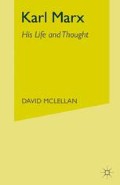Abstract
With the suppression of the Rheinische Zeitung, Marx found himself once again an unemployed intellectual. His immediate preoccupations were to find a secure job and get married. As far as journalism was concerned, Marx’s variety had become virtually impossible in Germany. The differences of opinion among the Young Hegelians, already manifest over their attitude to the Rheinische Zeitung, provoked a complete split following the decision of the Prussian Government to suppress the liberal Press. Those in Berlin, led by Bruno Bauer, tended more and more to dissociate themselves from political action. They had imagined their influence to be such that the suppression of their views would lead to a strong protest among the liberal bourgeoisie. When nothing of the sort happened, they confined themselves increasingly to purely theoretical criticism that deliberately renounced all hope of immediate political influence. The response of the group around Ruge was different: they wished to continue the political struggle — but in an even more effective manner. A review of their own still seemed to them the most promising means of political action, and their first ideas was to base themselves on Julius Froebel’s publishing house in Zürich. Froebel was a Professor of Mineralogy at Zürich who had started his business at the end of 1841 in order to publish the radical poems of Georg Herwegh; he also published a review, edited by Herwegh, which looked for a moment like a successor to the Deutsche Jahrbücher. With Herwegh’s expulsion from Zürich in March 1843 an obvious gap was waiting to be filled. Ruge was all the more attracted to Zürich as it was (together with Paris) the main centre of German expatriates. Given that these exiles comprised both intellec-tuals and workers, it was sensible that any new review should combine the theory of the Deutsche Jahrbūcher with the more immediately political ideas of the Rheinische Zeitung. Ruge had a great admiration for Marx and wrote to his brother, Ludwig: ‘Marx has great intelligence. He is very worried about his future and particularly his immediate future. So in continuing with the Jahrbūcher it is quite natural to ask for his assistance.’1 So when Ruge proposed in January 1843 that he and Marx by co-editors, Marx accepted with enthusiasm.
We are going to France, the threshold of a new world. May it live up to our dreams! At the end of our journey we will find the vast valley of Paris, the cradle of the new Europe, the great laboratory where world history is formed and has its ever fresh source. It is in Paris that we shall live our victories and our defeats. Even our philosophy, the field where we are in advance of our time, will only be able to triumph when proclaimed in Paris and impregnated with the French spirit.
A. Ruge, Zwei Jahre in Paris (Leipzig, 1846) I 4 ff.
Access this chapter
Tax calculation will be finalised at checkout
Purchases are for personal use only
Preview
Unable to display preview. Download preview PDF.
Copyright information
© 1973 David McLellan
About this chapter
Cite this chapter
McLellan, D. (1973). Paris. In: Karl Marx. Palgrave Macmillan, London. https://doi.org/10.1007/978-1-349-15514-9_2
Download citation
DOI: https://doi.org/10.1007/978-1-349-15514-9_2
Publisher Name: Palgrave Macmillan, London
Print ISBN: 978-0-333-15425-0
Online ISBN: 978-1-349-15514-9
eBook Packages: Palgrave Political & Intern. Studies CollectionPolitical Science and International Studies (R0)

